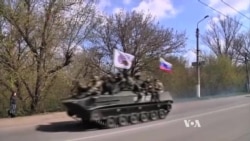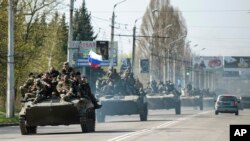KYIV —
Ukrainian authorities in Kyiv suffered a serious setback Wednesday in their efforts to restore order in the troubled east of the country when pro-Russian separatists seized several Ukrainian army armored vehicles, hoisting Russia flags on them.
The interception in the city of Slovyansk of a column of six armored personnel carriers, which comes on the eve of talks in Geneva between diplomats from Russia, Ukraine and the West, is adding to frustrations here in Kyiv about the failure of the country's new leaders to re-assert control in the east.
Kyiv authorities deny claims by locals that Ukrainian paratroopers manning the half dozen troop carriers switched sides after agitators offered them food. Separatists say the soldiers' morale was low and that they hadn't been given supplies for several days.
Ukrainian defense officials say the column was captured with the help of Russian agents. Kyiv insists that hundreds of Russian troops have crossed the border and are coaching and instructing separatists on tactics.
Witnesses say a second armored Ukrainian column moving toward Slovyansk was stopped by a crowd blocking the roadway. Western journalists say the Ukrainian occupants were only allowed to retreat after disabling their firearms.
Counter-intelligence chief Vitaly Nayda told a news conference Wednesday that the determination was made after intercepting conversations of the Russian military from Slovyansk.
He said 40 agents 'recruited by Russian security services' had been arrested. Nayada added that those arrested had admitted to being recruited and were now assisting with the investigation.
Moscow dismissed the allegation.
White House spokesman Jay Carney said Wednesday that Kyiv had responded with "admirable restraint" to the separatists actions, saying it was appropriate for the government to act to restore law and order.
The U.S. is considering a request from Ukraine's government for what a U.S. official calls non-lethal assistance.
Ukraine's new leaders, who replaced President Viktor Yanukovych ousted in February after months of street protests against his pro-Russian rule, are trying to dampen ethnic Russian agitation in east Ukraine by offering reforms and greater autonomy for the region.
They are also trying to measure their response to the seizing in the last few days by pro-Russian militants of government and security buildings in at least 10 towns in eastern Ukraine.
They fear that too strong an action will offer the Kremlin a pretext to order in an estimated 40,000-strong Russian army massed on the border in a posture that U.S. and NATO officials say is highly aggressive.
Kyiv's politicians claim Moscow has been infiltrating Russian provocateurs for weeks to incite much of the agitation in east Ukraine - an allegation also leveled by U.S. Secretary of State John Kerry.
The Kremlin denies this and has warned it is ready to send forces massed on the border to protect ethnic Russians - the initial reason given for seizing the Ukrainian peninsula of Crimea.
Pro-Russian activists deny the claims, often flashing Ukrainian passports to reporters.
According to the Kremlin, Russian President Vladimir Putin told German Chancellor Angela Merkel in telephone talks Wednesday that Ukraine is on the verge of civil war.
Amid escalating rhetoric between Moscow and Kyiv, a top British Conservative politician, John Whittingdale, told VOA he was pessimistic about the outcome of the scheduled four-way talks on Thursday in Geneva between senior diplomats from Russia, the European Union, the United States and Ukraine.
A top U.S. official also downplayed expectations for a breakthrough.
"We don't have high expectations for these talks, but we do believe it is very important to keep that diplomatic door open," said Assistant Secretary of State Victoria Nuland during a congressional hearing last week.
Russian Foreign Minister Sergei Lavrov tried to control Moscow’s agenda in a phone conversation with Kerry last week, saying the talks must focus on fostering dialogue among Ukrainians and not on bilateral relations among the participants, according to a statement from Russian foreign ministry.
United Nations Secretary General Ban Ki-moon has expressed his alarm over the "highly volatile situation" and has told the Russian leader that all parties need to "work to de-escalate the situation", his spokesman said.
Russia has accused the new Ukrainian government of provoking the crisis in eastern Ukraine by threatening the country's Russian-speaking minority and says far-ultranationalist Ukrainians are at the root of the problem.
But U.N. officials in a report issued Tuesday dubbed as "greatly exaggerated" allegations of harassment of ethnic Russians by Ukrainian nationalists.
As well as suffering the loss of the armored column Wednesday, Ukrainian authorities also failed to prevent the seizing by pro-Russian separatists of a third major government building in the city of Donetsk – this time the office of the city's mayor.
The only success Kyiv authorities have had on the ground in the east is regaining control earlier this week of a small airfield in the town of Kramatorsk.
But even there on Wednesday, a crowd of pro-Russian local citizens stopped several Ukrainian military vehicles on the outskirts of the town of Kramatorsk, blocking their way. They forced the soldiers to hand over parts of their weapons, rendering them unusable, before allowing the troops to continue on their way.
NATO to boost presence
Earlier, NATO announced it was boosting its presence near member states along the Russian border.
"We will have more planes in the air, more ships on the water, and more readiness on the land," Secretary-General Anders Fogh Rasmussen told a news conference. He added that the measures aim to immediately reinforce its military footprint in eastern Europe, in response to Russia's moves.
Constant Brant, a NATO public affairs officer in Brussels, said details of the deployment were still being worked out and that Allied Commander Philip Breedlove was expected to make an announcement regarding the make-up of the force in the coming days.
The United States and the European Union have both warned of imposing additional sanctions on top of punitive economic measures taken following Russia’s annexation of Crimea last month.
VOA's Catherine Maddux contributed to this report from Washington, some information provided by Reuters
The interception in the city of Slovyansk of a column of six armored personnel carriers, which comes on the eve of talks in Geneva between diplomats from Russia, Ukraine and the West, is adding to frustrations here in Kyiv about the failure of the country's new leaders to re-assert control in the east.
Kyiv authorities deny claims by locals that Ukrainian paratroopers manning the half dozen troop carriers switched sides after agitators offered them food. Separatists say the soldiers' morale was low and that they hadn't been given supplies for several days.
Ukrainian defense officials say the column was captured with the help of Russian agents. Kyiv insists that hundreds of Russian troops have crossed the border and are coaching and instructing separatists on tactics.
Witnesses say a second armored Ukrainian column moving toward Slovyansk was stopped by a crowd blocking the roadway. Western journalists say the Ukrainian occupants were only allowed to retreat after disabling their firearms.
Counter-intelligence chief Vitaly Nayda told a news conference Wednesday that the determination was made after intercepting conversations of the Russian military from Slovyansk.
He said 40 agents 'recruited by Russian security services' had been arrested. Nayada added that those arrested had admitted to being recruited and were now assisting with the investigation.
Moscow dismissed the allegation.
White House spokesman Jay Carney said Wednesday that Kyiv had responded with "admirable restraint" to the separatists actions, saying it was appropriate for the government to act to restore law and order.
The U.S. is considering a request from Ukraine's government for what a U.S. official calls non-lethal assistance.
Ukraine's new leaders, who replaced President Viktor Yanukovych ousted in February after months of street protests against his pro-Russian rule, are trying to dampen ethnic Russian agitation in east Ukraine by offering reforms and greater autonomy for the region.
They are also trying to measure their response to the seizing in the last few days by pro-Russian militants of government and security buildings in at least 10 towns in eastern Ukraine.
They fear that too strong an action will offer the Kremlin a pretext to order in an estimated 40,000-strong Russian army massed on the border in a posture that U.S. and NATO officials say is highly aggressive.
Kyiv's politicians claim Moscow has been infiltrating Russian provocateurs for weeks to incite much of the agitation in east Ukraine - an allegation also leveled by U.S. Secretary of State John Kerry.
The Kremlin denies this and has warned it is ready to send forces massed on the border to protect ethnic Russians - the initial reason given for seizing the Ukrainian peninsula of Crimea.
Pro-Russian activists deny the claims, often flashing Ukrainian passports to reporters.
According to the Kremlin, Russian President Vladimir Putin told German Chancellor Angela Merkel in telephone talks Wednesday that Ukraine is on the verge of civil war.
Amid escalating rhetoric between Moscow and Kyiv, a top British Conservative politician, John Whittingdale, told VOA he was pessimistic about the outcome of the scheduled four-way talks on Thursday in Geneva between senior diplomats from Russia, the European Union, the United States and Ukraine.
A top U.S. official also downplayed expectations for a breakthrough.
"We don't have high expectations for these talks, but we do believe it is very important to keep that diplomatic door open," said Assistant Secretary of State Victoria Nuland during a congressional hearing last week.
Russian Foreign Minister Sergei Lavrov tried to control Moscow’s agenda in a phone conversation with Kerry last week, saying the talks must focus on fostering dialogue among Ukrainians and not on bilateral relations among the participants, according to a statement from Russian foreign ministry.
United Nations Secretary General Ban Ki-moon has expressed his alarm over the "highly volatile situation" and has told the Russian leader that all parties need to "work to de-escalate the situation", his spokesman said.
Russia has accused the new Ukrainian government of provoking the crisis in eastern Ukraine by threatening the country's Russian-speaking minority and says far-ultranationalist Ukrainians are at the root of the problem.
But U.N. officials in a report issued Tuesday dubbed as "greatly exaggerated" allegations of harassment of ethnic Russians by Ukrainian nationalists.
As well as suffering the loss of the armored column Wednesday, Ukrainian authorities also failed to prevent the seizing by pro-Russian separatists of a third major government building in the city of Donetsk – this time the office of the city's mayor.
The only success Kyiv authorities have had on the ground in the east is regaining control earlier this week of a small airfield in the town of Kramatorsk.
But even there on Wednesday, a crowd of pro-Russian local citizens stopped several Ukrainian military vehicles on the outskirts of the town of Kramatorsk, blocking their way. They forced the soldiers to hand over parts of their weapons, rendering them unusable, before allowing the troops to continue on their way.
NATO to boost presence
Earlier, NATO announced it was boosting its presence near member states along the Russian border.
"We will have more planes in the air, more ships on the water, and more readiness on the land," Secretary-General Anders Fogh Rasmussen told a news conference. He added that the measures aim to immediately reinforce its military footprint in eastern Europe, in response to Russia's moves.
Constant Brant, a NATO public affairs officer in Brussels, said details of the deployment were still being worked out and that Allied Commander Philip Breedlove was expected to make an announcement regarding the make-up of the force in the coming days.
The United States and the European Union have both warned of imposing additional sanctions on top of punitive economic measures taken following Russia’s annexation of Crimea last month.
VOA's Catherine Maddux contributed to this report from Washington, some information provided by Reuters






